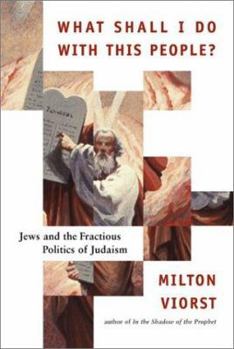What Shall I Do with This People?: Jews and the Fractious Politics of Judaism
"What shall I do with this people?" was Moses' exasperated question to God in Sinai, and it is posed once more in Milton Viorst's searching account of the crisis in Judaism today. Not since the... This description may be from another edition of this product.
Format:Hardcover
Language:English
ISBN:0684862891
ISBN13:9780684862897
Release Date:October 2002
Publisher:Free Press
Length:304 Pages
Weight:1.20 lbs.
Dimensions:0.6" x 6.3" x 9.4"
Customer Reviews
3 ratings
What Shall I Do With This People
Published by Thriftbooks.com User , 16 years ago
A group of us read this book recently for our book club and we all consider it must reading for anyone who wants a better understanding of Israel. Milton Viorst provides a highly readable (albeit abbreviated) history of Judaism with insightful analyses of the historical conflicts within that religion and how those conflicts influence the policies and government of Israel today. His overview of the complex and conflicted history of Judaism provides an extremely useful perspective for anyone trying to better understand Israel and events in the Middle East. Our group agreed that the book was thought-provoking and disturbing.
fascinating, interesting, disturbing
Published by Thriftbooks.com User , 20 years ago
I bought this book based on comments here, and a recommendation under a review of ONE PEOPLE, TWO WORLDS. But I have reason to question Viorst's accuracy, knowledge, and statements because of the following:P. 79 (Re: Yochanan ben Zakkai and his yeshiva at Yavneh) "His yeshiva ... also contributed to compiling and editing the books of the Bible, and presided over the Greek translation of what has since become the Old Testament." I assume he is referring to Aquila's translation of the Hebrew Scriptures into Greek, but "the Greek translation of ... the Old Testament" began a few hundred years earlier, and many NT quotations of the OT were from this earlier Greek translation (or others). Whatever Viorst means to say, he doesn't say it clearly.P. 87: "The word 'Torah,' which means 'guidance,' is absent from the Bible, and appeared only in Talmudic times." Huh???? The word "Torah" appears 220x in the Hebrew Bible, beginning with Genesis 26:5. How can Viorst mean what he writes here?Thus, while I find the book an interesting history of the way rabbinic Judaism came to be, statements like the above make me wonder if what I'm reading is accurate.The "Advance Praise" on the back of the dustjacket from Letty Cottin Pogrebin ("exhaustively researched") and Balfour Brickner ("a rich knowledge of Jewish history to produce a brilliant, accurate ... analysis") supports Viorst's veracity -- but the above two quotes undermine it, and there may be others that I won't recognize, due to being ignorant of these other matters.Having written the above, however, this book is eye-opening and fascinating reading for those like myself who have never read about this dark side of Jewish history. And it is dark.If the author is basically accurate (his endnotes and bibliography support him being accurate), then this is a troubling book that merits reading.
Enlightening, annoying, scary.
Published by Thriftbooks.com User , 21 years ago
Viorst is deeply troubled by two segments of the Jewish population which have little use for the goals and thinking of the Western enlightenment: the religious - expansionist Zionists, and the ultra-orthodox Haredim. He tries to put these movements into a historical and Biblical context as well as describing them in some detail. It is a stretch to relate the Biblical Jewish tendency to revert to idolatry to the themes of this book, but the historical context is enlightening. Unfortunately, I don?t quite trust Viorst?s scholarship when it comes to ancient history, which is treated in a rather cursory way even given the objectives of the book. When it comes to modern Israel, Virost?s writing is enriched by the many interviews he has conducted, often with people he totally disagrees with and even abhors, and he makes a definite effort to provide a fair account of their views and characters. Not withstanding this objectivity, Viorst seems unable to truly credit genuine piety and faith, or the marvelous aspects of the Talmudic way. Certainly, not all the traditional orthodox rabbi?s were acting out of pride and self-interest. I found this annoying, even though I totally agree with Viorst?s basic points. This is an enlightening and scary book.






